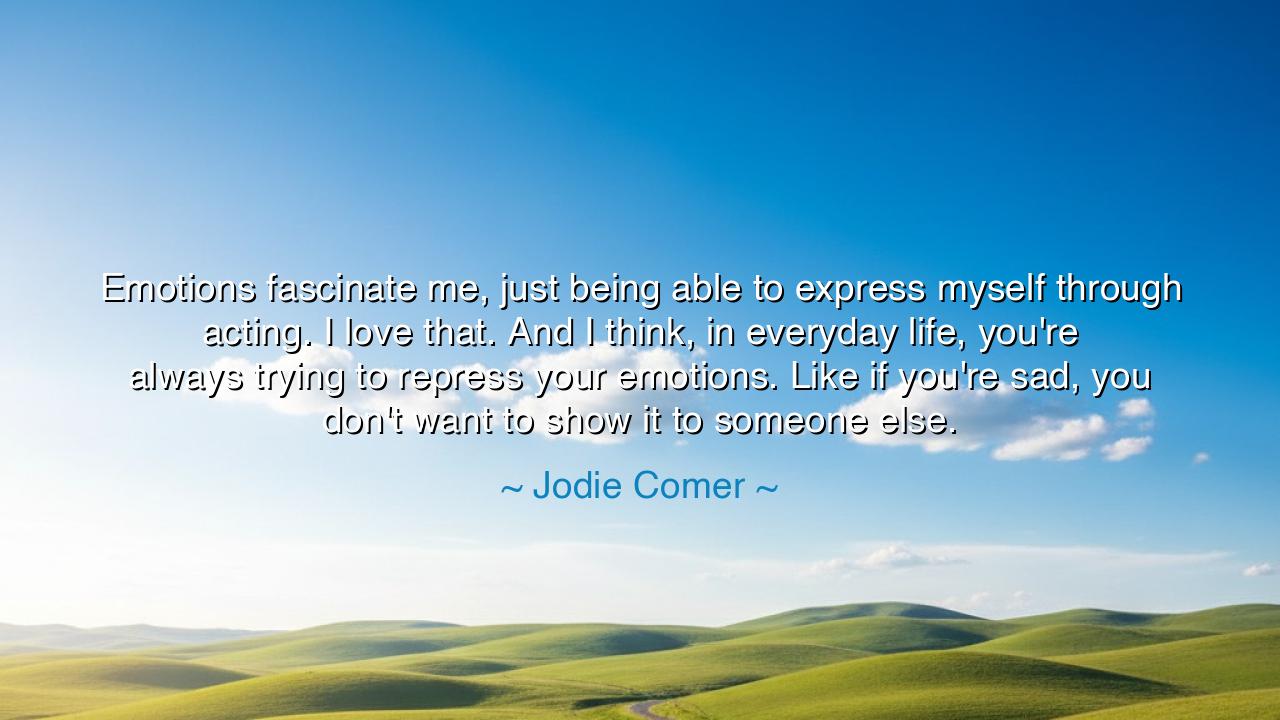
Emotions fascinate me, just being able to express myself through
Emotions fascinate me, just being able to express myself through acting. I love that. And I think, in everyday life, you're always trying to repress your emotions. Like if you're sad, you don't want to show it to someone else.






There is an exquisite tenderness in the words of Jodie Comer, who said, “Emotions fascinate me, just being able to express myself through acting. I love that. And I think, in everyday life, you're always trying to repress your emotions. Like if you're sad, you don't want to show it to someone else.” Within these lines, one hears not only the voice of an artist, but the echo of an ancient truth: that emotion — the very pulse of the human soul — is both our deepest gift and our greatest burden. Comer speaks as one who understands that expression is liberation, that art allows what ordinary life forbids — the full unveiling of the heart.
The origin of this quote lies in Comer’s reflection on her craft as an actress, yet its wisdom stretches far beyond the stage. Acting, for her, becomes a sacred act of honesty — a place where feeling is not hidden but transformed, where sorrow and joy, fear and love, may be explored without shame. In life, she observes, we are taught to repress emotion, to wear calmness like armor. Society tells us to smile when we ache, to be composed when we tremble. But in art, she finds freedom — the right to feel fully, to grieve, rage, laugh, and love with unfiltered humanity. In this sense, acting becomes not mere performance, but purification, a restoration of the soul’s natural state.
The ancients, too, believed in this power. The philosopher Aristotle spoke of catharsis — the cleansing of emotion through art. Tragedy, he said, allows us to experience pity and fear not as weaknesses, but as paths to understanding. The actors of the Greek stage wore masks, not to conceal their souls, but to reveal the truth of the human condition — magnified, raw, and unashamed. In the same way, Comer’s fascination with emotion is not indulgence but reverence: she honors the truth that emotion is the lifeblood of humanity, the bridge between thought and soul, reason and heart.
Consider the story of Eleanora Duse, the great Italian actress of the nineteenth century. Unlike her contemporary Sarah Bernhardt, who dazzled through grandeur and voice, Duse acted with quiet vulnerability. She expressed emotion not by exaggeration, but by truth — by letting her heart tremble in silence. When she played Juliet, audiences wept not because she was theatrical, but because she was real. Her art, like Comer’s, was a rebellion against repression — a reminder that the truest beauty lies in the courage to feel.
Comer’s words also reveal a quiet sorrow: that modern life, though full of connection, often breeds emotional solitude. We scroll and speak, yet rarely reveal. We fear that showing pain makes us weak, that sharing sadness will burden others. Thus, we build walls — polished, smiling, unbreakable. But in doing so, we lose the essence of our humanity. Emotion, suppressed, does not vanish; it festers. It becomes anxiety, numbness, alienation. To deny feeling is to deny the very rhythm of life — the ebb and flow of joy and suffering that makes the heart grow wise.
Yet there is hope in her confession. Comer reminds us that the gift of emotion can still be reclaimed — through art, through love, through courage. To express oneself, even in small ways — through music, through words, through tears — is to return to one’s truest self. The ancients would call this authentic living — to live not behind masks of civility, but in harmony with one’s inner world. The one who learns to express emotion wisely becomes both artist and sage, for they have learned to let feeling illuminate rather than destroy.
The lesson, my children, is this: do not fear your emotions, and do not hide them from life. To feel deeply is not weakness — it is wisdom. Let your sadness teach you compassion, your anger teach you justice, your love teach you courage. Express what is within you before it turns to stone. Speak, write, sing, weep, dance — whatever keeps your soul from silence. For repression builds prisons, but expression builds wings.
And so, remember the truth of Jodie Comer’s reflection: emotion is the mirror of the soul, and expression is its freedom. The world may teach you to hide your tears, but art — and life itself — call you to reveal them. For only when we dare to feel do we truly live, and only when we allow our emotions to breathe do we discover that the heart, unbound, is the most powerful force in all creation.






AAdministratorAdministrator
Welcome, honored guests. Please leave a comment, we will respond soon